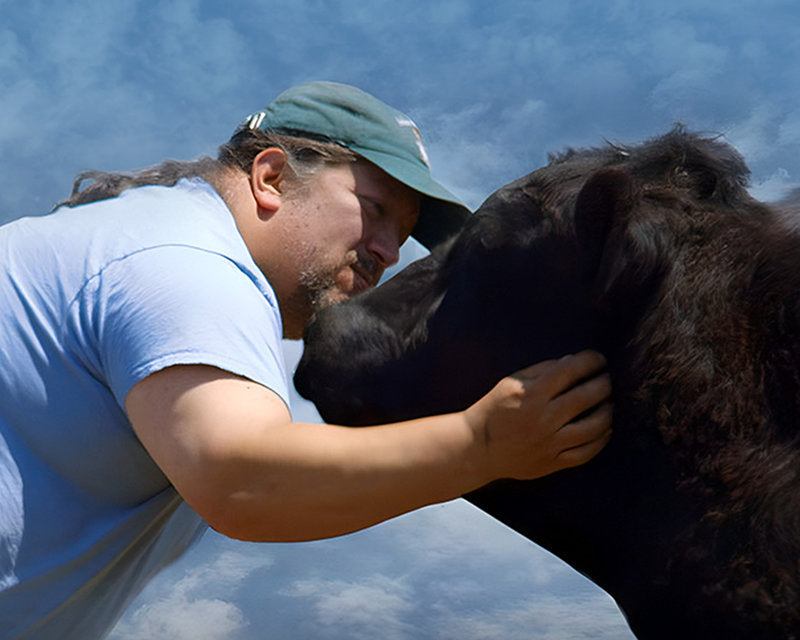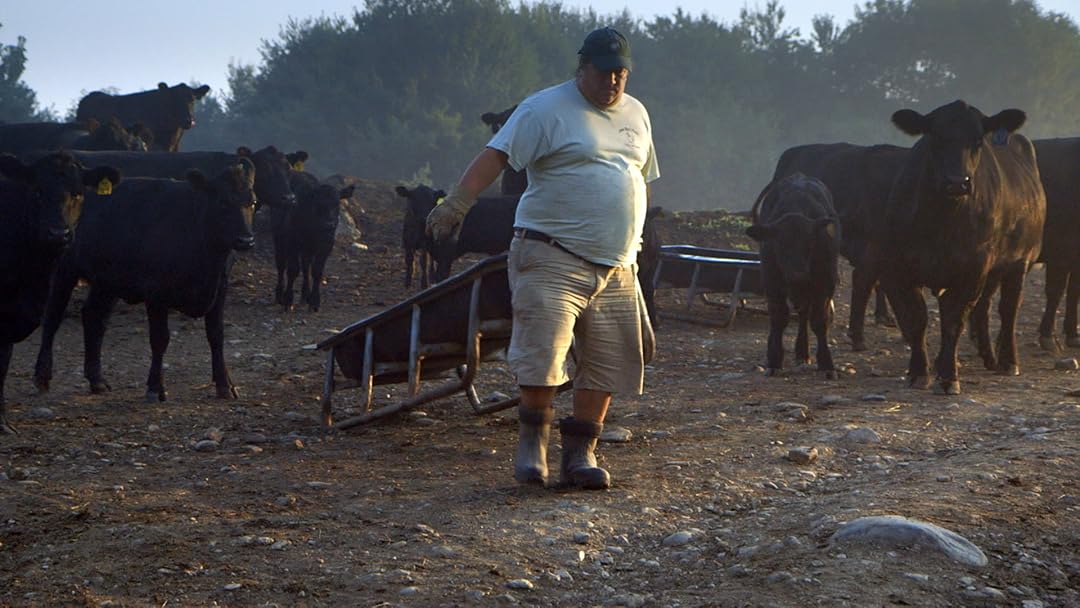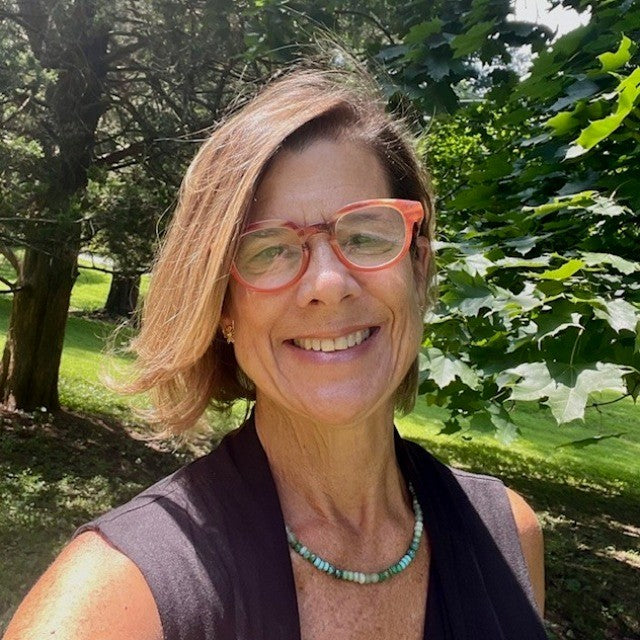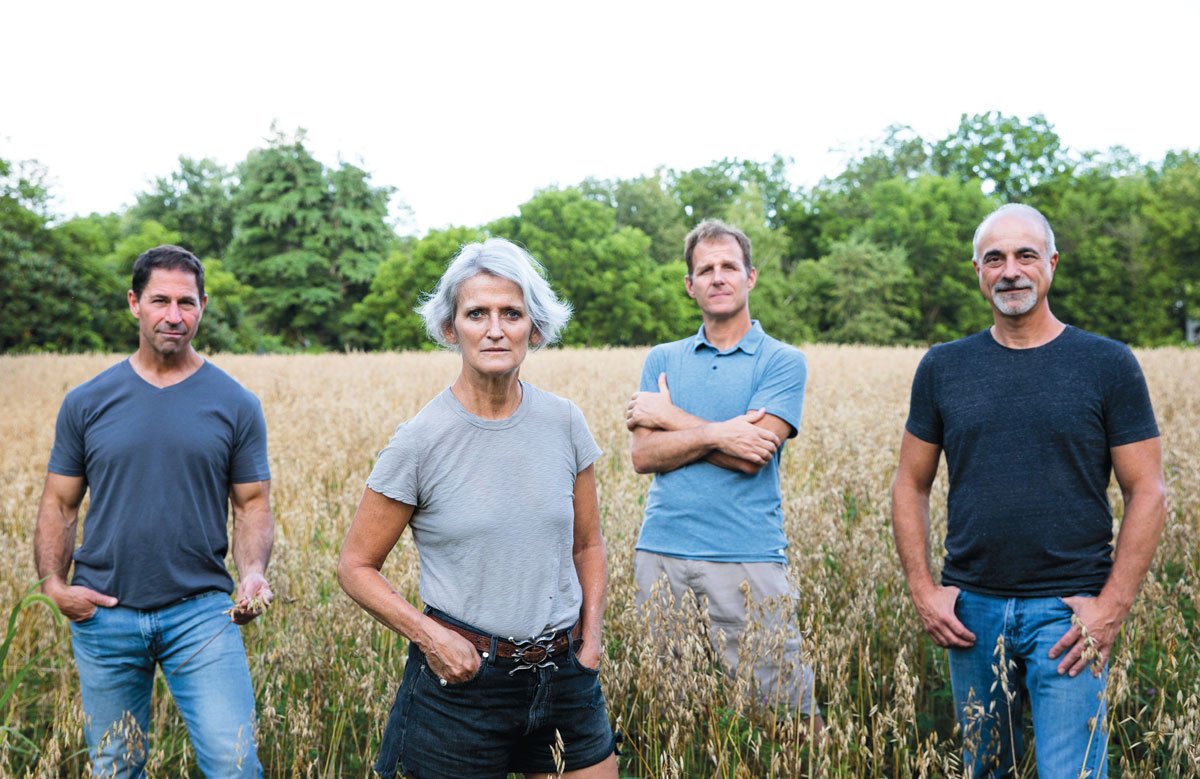A Fork in the Road
In conversation with John Ubaldo
When John Ubaldo was working a Wall Street finance job in the late nineties, he dreamt of becoming a farmer. “Everybody was reading Forbes and the Robb Report, while I was reading Farm & Ranch magazine and planning a way to pull this off,” he remembers, but it wasn’t until the early aughts that he took a leap of faith and changed careers.
First, John moved back to his childhood home in Pound Ridge, New York, where he quickly filled his backyard with about 400 chickens, ducks, turkeys, and Guinea hens. Then, he began searching for farms to buy—which was a challenge. “Everything was either a big farm that was a wreck or a small farm that was in horse country, so you had to pay a million dollars for like eight acres,” he recalls.
John finally found his farm in 2003, when he came across a parcel of land in Cambridge, New York that he had attempted to purchase 20 years earlier. “It was sold out from under us to a real estate developer,” he reveals. “My whole thing is you never get a chance to do something stupid twice, so I bought the property. It hadn't been a farm in about 50 years. There was no electricity or running water in the barns. I literally had to build the place from scratch.”
Now, two decades later, John Boy’s Farm is renowned for raising Berkshire pigs and Black Angus cattle—all of which are born and bred on the farm. John still has a huge flock of birds, too. He sells his goods all over New York, including at Mast Market, where we stock his sausages, steaks, and more. Here, he shares why he chose to pursue animal husbandry, the ethos behind his farm, and how he’s helping his community.

Mast Journal: How did you decide to pursue animal husbandry? Rather than farming vegetables and fruits?
John Ubaldo: It doesn't appeal to me to spend my time on my hands and knees pulling weeds. And my brother is a chef. He showed me what was called the Rosen Garden Report. I don't even know if it's still in existence, but the guy went around the country in search of the perfect ham. The perfect ham came from a Berkshire pig and a smoker down in the Virginia area or something. So I got really intrigued about these Berkshire pigs.
I started reading up on them. They're the oldest registered breed in the country. They are not big litter pigs. Their meat is called the Kobe beef of pork. And they make decent mothers. I called the president of the Berkshire Association, told him I wanted pigs from him, and he said, ‘No.’ So I bothered him for about a month or two. Then he relented and he sold me one of his boars. His buddy up the street sold me 10 females.
I had no idea what I was doing. When they showed up, I had nothing. No fences, no anything really set up. We threw them in the barn and they were just shaking their heads at me. I said, ‘Well, should I keep the boy away from all those girls?’ And the old man just looked at me and he said, ‘Trial by fire, son.’ Pigs take three months, three weeks, three days, three in the morning before they have babies. That's their gestation. All of a sudden, I was awake for three days straight having babies. I called the old man up in Pennsylvania and cursed him out.
MJ: That’s wild.
JU: Yeah, it was wild. It was wild for sure. I had no idea what I was doing. I was sitting up on this hill all alone, having pigs 24/7, and having the most scary, amazing time that you could possibly have.
MJ: You were alone?
JU: I was up on this hill alone in the beginning until I decided I needed to get some workers here. It was probably about eight months until my wife at the time said, ‘You're probably going to die if you don't get some help here.’
MJ: Wow. And how has the farm developed in the 20 years since then?
JU: I started doing farmer's markets, which were great. And then the farmer's markets started turning into craft shows and people selling stuff out of boxes. I wasn't thrilled with the integrity of the farmer's markets, so I bailed out and I bought the store, which is now your store.

MJ: Yes, Mast Market is taking over the Bedford, New York space where you had your outpost.
JU: I spent 10 years running the outpost. That is where 99 percent of my meat went through. I went through a period in the beginning of selling stuff into the city, dealing with the famous chefs, them wanting stuff for free or cheap because of who they were, having to chase money. So the outpost became the ideal place for me to just have the control I needed and really be able to survive and not have to waste time chasing money.
We recently sold the outpost to you guys and I'm going to be working with Rick when you guys reopen. We have some stuff in your New York City location. And we have some new projects starting that are really going to change the landscape. We're going to be doing a lot of different things now to grow the business. My original focus was to help a lot of local farms in the area, so that's why I'm back up here, to focus on that because the store was taking too much time.
MJ: What does helping local farms entail?
JU: We bought an abandoned McDonald's about a half an hour south of here and we're turning it into a food hub, a distribution and fulfillment center. We are teaming up with about 30 farms up here, metabolic doctors around the country, and health influencers to market a line of all northeast-grown, grass-fed beef and pork.
MJ: That’s so cool!
JU: Yeah, it is pretty cool because it brings me back to what my original program was before I became a glamorous store owner. In the past five years, New York state has lost 3,000 farms. The USDA has characterized the dairy milk and beef production as ‘plummeting.’ That is a word that the USDA used, so I don't think that's awesome.
But I think it's awesome that we're coming at a time where we could really be a lifeline and we can really change the dynamic of the industry. Usually, the distributor is the one that screws the farmers and the packers. But we are going to be a farmer-owned distributor, so we will always be out there protecting the farmers as we distribute everything. It's a pretty different dynamic and I'm pretty excited about it. I think it's going to make a pretty good impact.
MJ: It will definitely make a huge difference.
JU: I live in a really poor area and a lot of these farms do really, really great work, but they don't have access to larger markets or fundraising or influencers or tech people. So I've managed to put together a really great team of awesome people to create something that will give them stability. It will give them the ability to plan long-term and really make investments in their farm without the panic of wondering if it’ll pay off.
I’ve used the same blueprint for the past 15 years with vegetable farms. We've helped them using a very similar model, where I am the distribution network and they just get to grow. Farmers don't want to deal with business. They just want to farm. So that's what we provide. Some of the vegetable farms have really been able to settle in and buy their own land because we've helped them bring in money that they wouldn't see just doing local farmer's markets. That’s okay in some bigger towns, like Saratoga, but around here it's a little tough. So this is just a blueprint and we’re taking it to the next level times a hundred.
MJ: Amazing. Can you tell us what products you offer?
JU: We do bacon, sausages, braised pork belly, hams, smoked hocks, smoked pork gels, and, of course, all the regular cuts and ribs and chops. I do a fair amount of smoking here at the farm. We are going to start doing beef jerky and Slim Jims. We always make chicken and beef bone broth. We're constantly busy trying to make products that we can bring out to the marketplace. You have to do value adds to survive.
MJ: For sure.
JU: It's necessary and it's fun. I've been smoking since I was in my teens, so I have a lot of years of experience and a lot of people have shown me really how to do it properly along the way.
MJ: That’s cool. Do you like to cook?
JU: I love cooking. We did a lot of cooking at the outpost. I do a lot of catering. I'm a private chef for a few people. We also don't eat out, so I have to love cooking and I do. I have no problem getting out the pans and whipping up anything. My son has a palette of a 45-year-old chef. He’s going to be 11 in April. When you ask a kid what their favorite food is, they probably would tell you nuggets and pizza, but he's going to tell you bolognese, swordfish, grilled octopus, and chicharrónes.
MJ: That’s so sophisticated! Where did the name John Boy’s Farm come from?
JU: When I was a kid, my dad used to call me John Boy. Not because of the Waltons. My dad just called me John Boy. So I felt it was fitting to call the farm John Boy's Farm because it basically started on my parents' property. On my t-shirts, it says, ‘It’s all good.’ That is my sarcastic answer when people ask me, ‘What's good?’
And I used to be in a band with a lead singer and guitarist who was absolutely cuckoo. No matter what was going wrong, we’d say, ‘It's all good.’ One day we were on tour, traveling through Nevada, and the van broke down. He jumped out and started playing the damn guitar for the cows, and I was like, ‘We're totally screwed out here, man. We have no way of getting to San Francisco.’ And he said, ‘It's all good.’ So I drove back to LA and I got on a plane and never played in the band again.
MJ: Wow. That’s a great story.
JU: I went home to my chickens and that was it.
MJ: Is there anything else Mast Market customers should know about John Boy’s Farm?
JU: This is all about not cutting corners. This is all about farming the way things were done a hundred years ago. The integrity of the farm is what got me to where I am today. Our animals are incredibly spoiled. They're hand-fed and they're given probiotics. People use monensin as a digestive growth promoter in cattle, but we use garlic and cinnamon instead. We use herbs. We try to produce the cleanest food you can eat. My big thing is the importance of staying away from chemicals and supermarkets. We are the most unhealthy developed nation in the world.
I’m trying to be an example of how this can and should be done, which is why I bailed out of the store and came back up here. You only have so much time in your day. You only have so much time in your life, so you need to use it wisely. For me, that is helping farmers because at some point this country might actually change and people are going to be looking for this type of food. If it isn't available, they're going to say, ‘Screw it,’ and get back on the McDonald's line.
My ultimate goal is to have this become the norm. The banks call us specialty ag—even though my farm is multi-species and set up like a farm from a hundred years ago—which is a nice way of them saying, ‘No, we will never give you any money.’ But I want this whole specialty ag concept to become something that we accept and respect. My farm has gotten to where it is because we lead by example. Holding our principles and not cutting corners, both on the farm and at the store, has really helped us get the recognition that we have.
More from The Journal

For the past 14 years, Bedford 2030 has been working to reduce greenhouse gas emissions and protect the earth’s natural resources in Westchester County and beyond. The nonprofit is dedicated to add...
Read more
On the surface, the three men behind River Valley Community Grains are millers, but the business that Lenny Bussanich, Mike Hozer, and Larry Mahmarian have built is about much more than making flou...
Read more